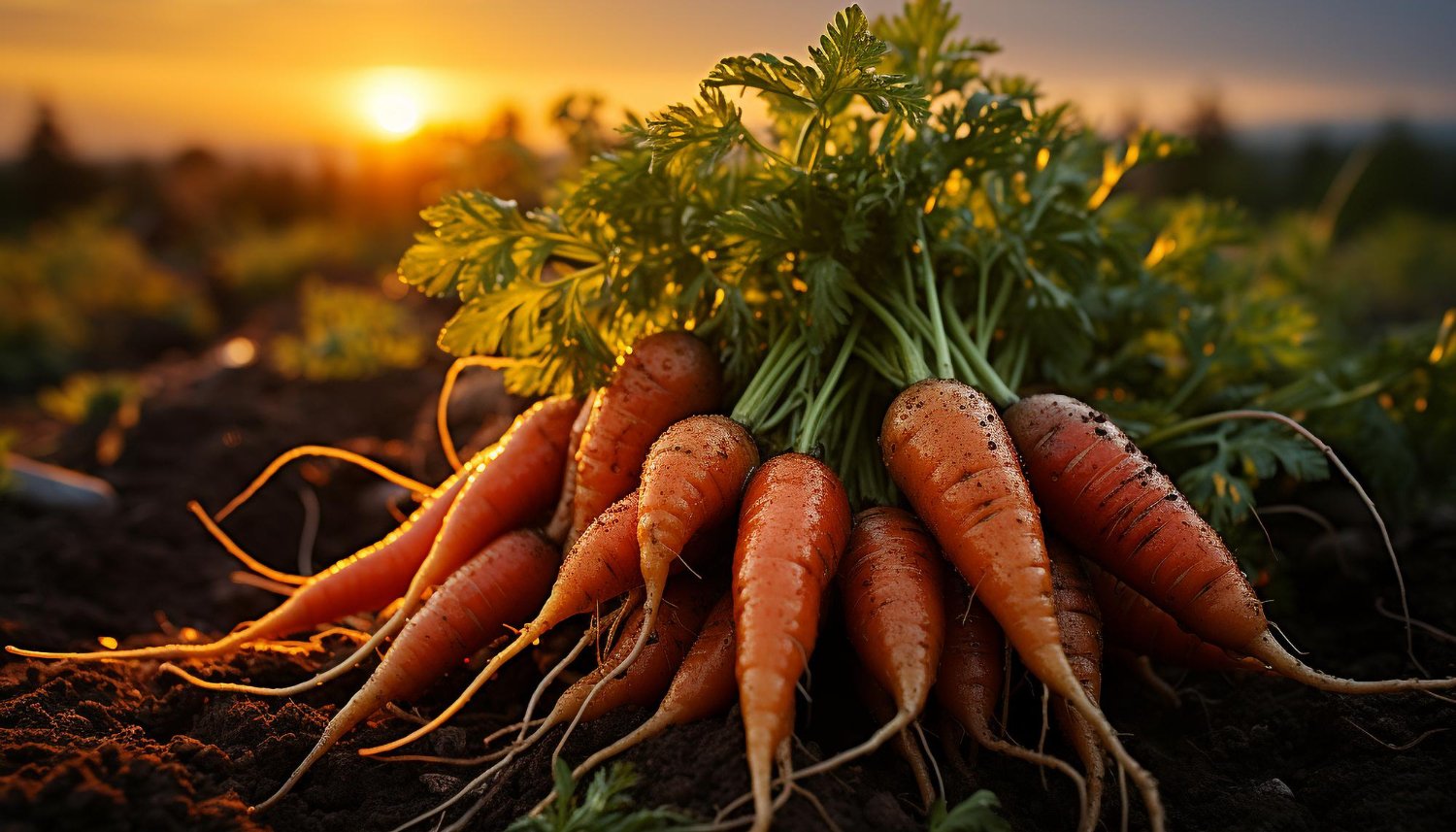
Carrots, with their vibrant color and crisp texture, are not only a delicious addition to salads and meals but also a nutritional powerhouse.
In this comprehensive guide, we will explore the fascinating world of carrots, from their ancient origins to practical tips on growing, harvesting, and enjoying these nutritious root vegetables.
History of Carrots
Carrots have a rich and storied history that spans thousands of years. Believed to have originated in Central Asia, carrots were initially cultivated for their aromatic leaves and seeds rather than their roots.
Over time, through selective breeding, carrots evolved into the plump, orange vegetables we know today.
They have played a significant role in various cultures and cuisines, from ancient civilizations like the Egyptians and Greeks to their eventual spread across Europe and beyond.
Nutritional Benefits
Carrots are renowned for their nutritional profile, packed with essential vitamins, minerals, and antioxidants. They are particularly rich in vitamin A, which is crucial for maintaining healthy vision, skin, and immune function.
Additionally, carrots contain vitamin C, potassium, and fiber, making them a valuable addition to any diet. Regular consumption of carrots has been linked to numerous health benefits, including improved heart health, digestion, and even reduced risk of certain chronic diseases.
Varieties of Carrots
Carrots come in a diverse array of colors, shapes, and sizes, each with its own unique flavor and characteristics. While the classic orange carrot is the most common, you can also find purple, red, yellow, and white varieties.
Some carrots are long and slender, while others are short and stout. The choice of variety depends on personal preference and culinary use, with each type offering its own distinct taste and texture.
Growing Conditions
To grow healthy and vibrant carrots, it’s essential to provide the right growing conditions. Carrots thrive in loose, well-drained soil that is free from rocks and debris.
They prefer full sunlight but can tolerate partial shade, especially in hot climates. Adequate moisture is crucial for carrot growth, so regular watering is necessary, particularly during dry periods.
Additionally, carrots benefit from a layer of organic mulch to retain moisture and suppress weeds.
Planting Carrots
When it comes to planting carrots, selecting the right seeds is key. Choose high-quality seeds from reputable sources, ensuring they are fresh and free from disease.
Carrots are typically sown directly into the garden soil, as they do not transplant well due to their delicate root systems.
Plant seeds in shallow furrows, spaced according to the recommended guidelines for the chosen variety. Cover lightly with soil and keep the bed consistently moist until germination occurs.
Carrot Care
Once planted, carrots require minimal maintenance to thrive. Keep the soil evenly moist but not waterlogged, as excessive moisture can cause the roots to rot.
Regular weeding is essential to prevent competition for nutrients and space. Additionally, carrots may benefit from a balanced fertilizer application halfway through the growing season to promote healthy growth.
Be mindful of pests such as carrot rust flies and aphids, and take appropriate measures to control them if necessary.
Harvesting Carrots
Knowing when to harvest carrots is crucial for optimal flavor and texture. Carrots are typically ready for harvest when they reach their mature size and develop a deep, vibrant color.
To check for readiness, gently pull back the soil around the top of the carrot and inspect the root. If it is firm and smooth, with a bright color and crisp texture, it is ready to be harvested.
Use a garden fork or trowel to loosen the soil around the carrots before carefully lifting them out to avoid damage.
Storing Carrots
Proper storage is essential for preserving the freshness and flavor of harvested carrots. Remove the tops, leaving a small stub to prevent moisture loss, and brush off any excess soil.
Carrots can be stored in the refrigerator in a perforated plastic bag or container for up to several weeks.
Alternatively, you can store them in a cool, dark place such as a root cellar or garage, where they will keep for several months if properly stored.
Culinary Uses
Carrots are incredibly versatile in the kitchen, lending themselves to a wide range of culinary applications. They can be enjoyed raw as a crunchy snack or grated into salads for added texture and sweetness.
Carrots also shine when cooked, whether roasted, steamed, sautéed, or pureed into soups and sauces.
Their natural sweetness pairs well with savory flavors and spices, making them a favorite ingredient in both sweet and savory dishes.
Health Considerations
While carrots offer numerous health benefits, it’s essential to consume them in moderation as part of a balanced diet.
Excessive intake of carrots, particularly in the form of carrot juice or supplements, can lead to a condition called carotenemia, characterized by yellowish skin discoloration.
Additionally, some individuals may experience allergies or sensitivities to carrots, although these reactions are rare.
Sustainability
Growing carrots at home not only provides you with a fresh, nutritious supply but also promotes sustainability.
By reducing reliance on store-bought produce and minimizing food miles, home gardening can have a positive impact on the environment.
Plus, growing your own carrots allows you to control the use of pesticides and fertilizers, resulting in healthier, more sustainable harvests.
Fun Facts
Did you know that carrots were originally cultivated for their aromatic leaves and seeds rather than their roots? Or that the world’s longest carrot on record measured over 19 feet long? These are just a few of the fascinating facts about carrots that highlight their rich history and cultural significance.
Conclusion
In conclusion, growing carrots is a rewarding and fulfilling experience that offers numerous benefits for both your health and the environment.
Whether you’re a seasoned gardener or a novice enthusiast, cultivating carrots at home is a straightforward and enjoyable process.
From planting to harvest, there’s nothing quite like the satisfaction of growing your own nutritious root vegetables.
